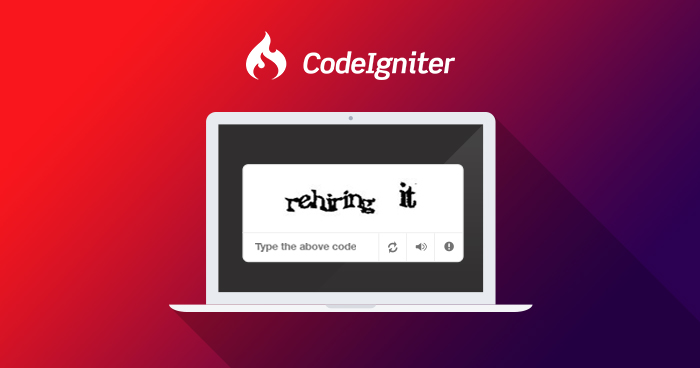CAPTCHA is a randomly generated string (or a set of images) that appears when verification is required. It is an essential requirement for cutting down the spam at a website. In many cases, it is the only line of defense a website has against bots that spam websites.

In this tutorial, I will demonstrate how you can easily implement CAPTCHA in your CodeIgniter projects.
Create Controller
The process starts with the creation of the Controller.
Create a file named captcha.php in the Controller folder. Open the file in your code editor and add the following code to it:
<?php
defined(‘BASEPATH’) OR exit(‘your exit message’);
class Captcha extends CI_Controller
{
function __construct()
{
parent::__construct();
$this->load->helper(‘captcha’);
}
public function index()
{
if ($this->input->post(‘submit’)) {
$captcha_insert = $this->input->post(‘captcha’);
$contain_sess_captcha = $this->session->userdata(‘valuecaptchaCode’);
if ($captcha_insert === $contain_sess_captcha) {
echo ‘Success’;
} else {
echo ‘Failure’;
}
}
$config = array(
‘img_url’ => base_url() . ‘image_for_captcha/’,
‘img_path’ => ‘image_for_captcha/’,
‘img_height’ => 45,
‘word_length’ => 5,
‘img_width’ => ’45’,
‘font_size’ => 10
);
$captcha = create_captcha($config);
$this->session->unset_userdata(‘valuecaptchaCode’);
$this->session->set_userdata(‘valuecaptchaCode’, $captcha[‘word’]);
$data[‘captchaImg’] = $captcha[‘image’];
$this->load->view(‘captcha/index’, $data);
}
public function refresh()
{
$config = array(
‘img_url’ => base_url() . ‘image_for_captcha/’,
‘img_path’ => ‘image_for_captcha/’,
‘img_height’ => 45,
‘word_length’ => 5,
‘img_width’ => ’45’,
‘font_size’ => 10
);
$captcha = create_captcha($config);
$this->session->unset_userdata(‘valuecaptchaCode’);
$this->session->set_userdata(‘valuecaptchaCode’, $captcha[‘word’]);
echo $captcha[‘image’];
}
}
Code Explanation
Here is a brief explanation of the various components of the Controller code:
Load CAPTCHA Helper
$this->load->helper(‘captcha’);
Form Submission
if ($this->input->post(‘submit’)) {
$captcha_insert = $this->input->post(‘captcha’);
$contain_sess_captcha = $this->session->userdata(‘valuecaptchaCode’);
if ($captcha_insert === $contain_sess_captcha) {
echo ‘Success’;
} else {
echo ‘Failure’;
}
}
CAPTCHA Configuration
‘img_url’ => base_url() . ‘image_for_captcha/’,
‘img_path’ => ‘image_for_captcha/’,
‘img_height’ => 45,
‘word_length’ => 5,
‘img_width’ => ’45’,
‘font_size’ => 10
Refresh CAPTCHA
Create the View
The next step is the creation of the View. for this, create a folder in the View folder. Go into the folder and create another folder with the name captcha. inside this folder, create a file named index.php. Add the following code to the file:
<!DOCTYPE html>
<html>
<head>
<title>Implement Captcha in Codeigniter using helper</title>
<script>
$(document).ready(function(){
$(‘.captcha-refresh’).on(‘click’, function(){
$.get(‘<?php echo base_url().’captcha/refresh’; ?>’, function(data){
$(‘#image_captcha’).html(data);
});
});
});
</script>
<script src=“<?php echo base_url(); ?>/js/jquery.js”></script>
</head>
<body>
<p id=“image_captcha”><?php echo $captchaImg; ?></p>
<a href=“javascript:void(0);” class=“captcha-refresh” ><img src=“<?php echo base_url().‘images/refresh.png’; ?>“/></a>
<form method=“post”>
<input type=“text” name=“captcha” value=“”/>
<input type=“submit” name=“submit” value=“SUBMIT”/>
</form>
</body>
</html>
Another Method of Calling CAPTCHA with Validation
Here is another method that is used to call in CAPTCHA through CodeIgniter helper and then validate it.
<?php
class Captcha extends CI_Controller
{
public function index()
{
$this->load->helper(array(‘form’, ‘url’, ‘captcha’));
$this->load->library(‘form_validation’);
$this->form_validation->set_error_delimiters(‘<div class=”error”>’, ‘</div>’);
$this->form_validation->set_rules(‘username’, ‘Username’, ‘trim|required|xss_clean’);
$this->form_validation->set_rules(‘password’, ‘Password’, ‘trim|required|xss_clean|callback_check_database’);
$this->form_validation->set_rules(‘captcha’, ‘Captcha’, ‘callback_validate_captcha’);
if ($this->form_validation->run() == FALSE) {
$original_string = array_merge(range(0, 9), range(‘a’, ‘z’), range(‘A’, ‘Z’));
$original_string = implode(“”, $original_string);
$captcha = substr(str_shuffle($original_string), 0, 6);
$vals = array(
‘word’ => $captcha,
‘img_path’ => ‘image_for_captcha/’,
‘font_size’ => 10,
‘img_width’ => 150,
‘img_height’ => 50,
‘expiration’ => 7200
);
$cap = create_captcha($vals);
$data[‘image’] = $cap[‘image’];
if (file_exists(BASEPATH . “../captcha/” . $this->session->userdata[‘image’]))
unlink(BASEPATH . “../captcha/” . $this->session->userdata[‘image’]);
$this->session->set_userdata(array(‘captcha’ => $captcha, ‘image’ => $cap[‘time’] . ‘.jpg’));
$this->load->view(‘index_index’, $data);
} else {
if (file_exists(BASEPATH . “../captcha/” . $this->session->userdata[‘image’]))
unlink(BASEPATH . “../captcha/” . $this->session->userdata[‘image’]);
$this->session->unset_userdata(‘captcha’);
$this->session->unset_userdata(‘image’);
redirect(‘home’, ‘refresh’);
}
}
public function validate_captcha()
{
if ($this->input->post(‘captcha’) != $this->session->userdata[‘captcha’]) {
$this->form_validation->set_message(‘validate_captcha’, ‘Cpatcha Code is wrong’);
return false;
} else {
return true;
}
}
}

